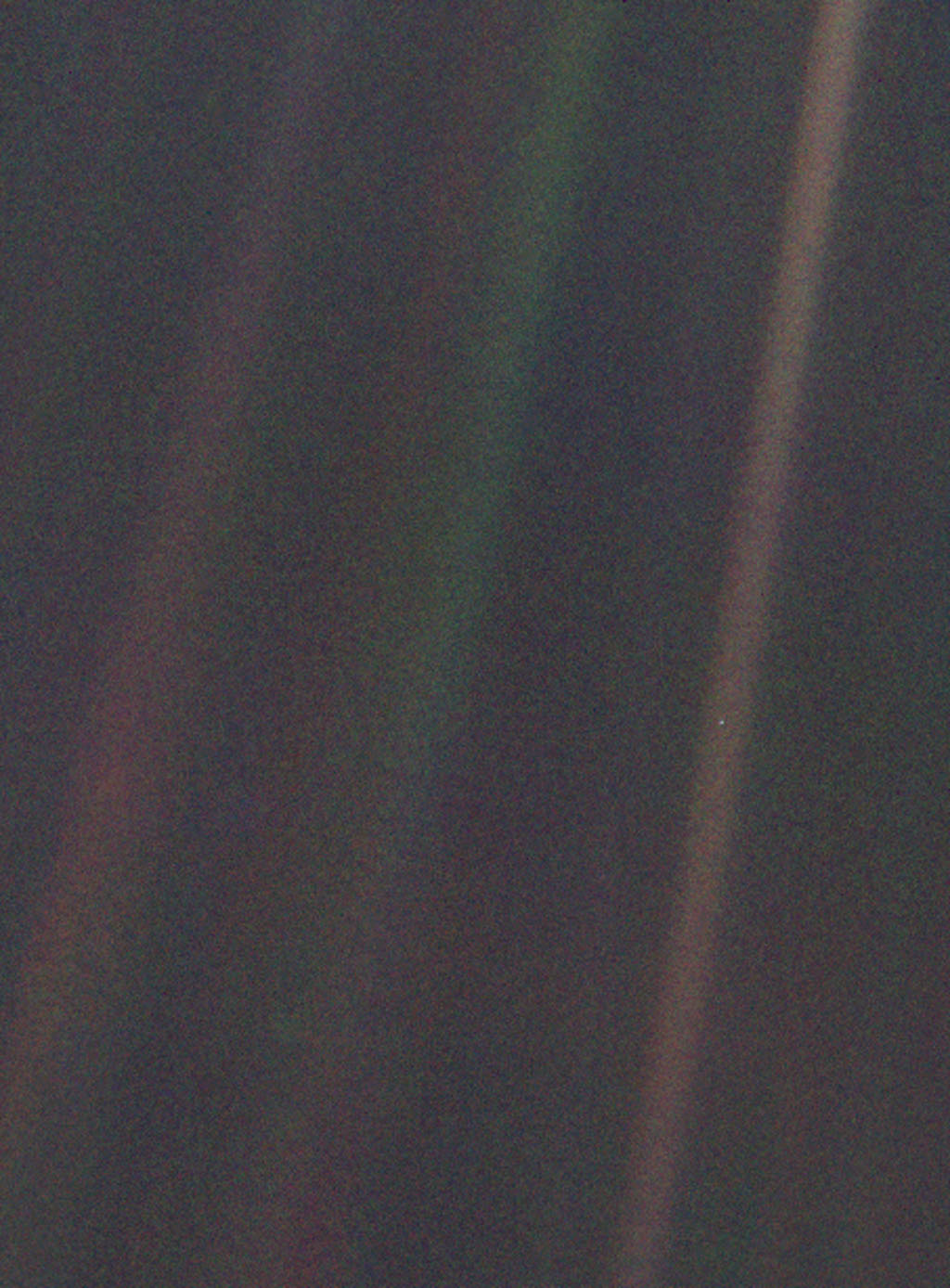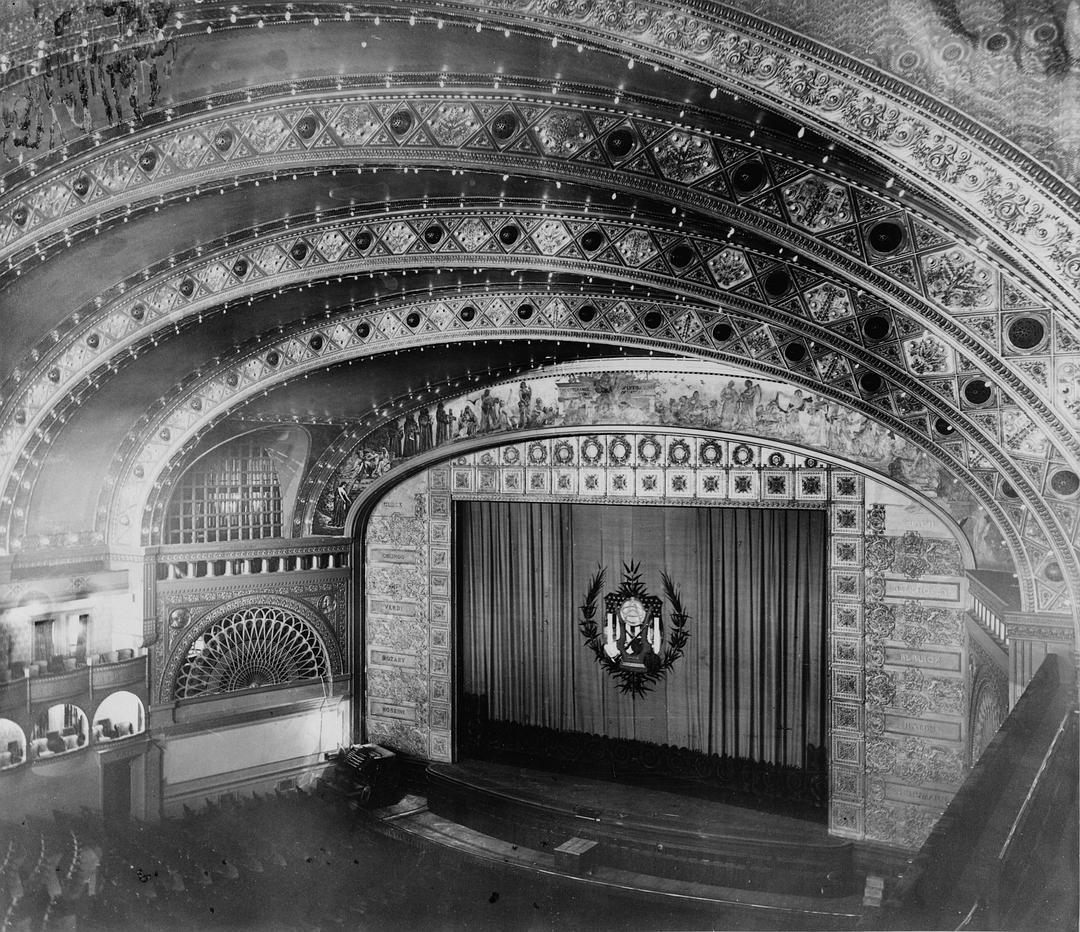Pale Blue Dot: A Vision of the Human Future in Space
蓝色淡点
Look again at that dot. That’s here. That’s home. That’s us. On it everyone you love, everyone you know, everyone you ever heard of, every human being who ever was, lived out their lives. The aggregate of our joy and suffering, thousands of confident religions, ideologies, and economic doctrines, every hunter and forager, every hero and coward, every creator and destroyer of civilization, every king and peasant, every young couple in love, every mother and father, hopeful child, inventor and explorer, every teacher of morals, every corrupt politician, every “superstar,” every “supreme leader,” every saint and sinner in the history of our species lived there–on a mote of dust suspended in a sunbeam.

The Earth is a very small stage in a vast cosmic arena. Think of the rivers of blood spilled by all those generals and emperors so that, in glory and triumph, they could become the momentary masters of a fraction of a dot. Think of the endless cruelties visited by the inhabitants of one corner of this pixel on the scarcely distinguishable inhabitants of some other corner, how frequent their misunderstandings, how eager they are to kill one another, how fervent their hatreds.
Our posturings, our imagined self-importance, the delusion that we have some privileged position in the Universe, are challenged by this point of pale light. Our planet is a lonely speck in the great enveloping cosmic dark. In our obscurity, in all this vastness, there is no hint that help will come from elsewhere to save us from ourselves.
我们成功地从外太空拍到这张照片,细心再看,你会看见一个小点。就是这里,就是我们的家,就是我们。在这点上有所有你爱的人、你认识的人、你听过的人、曾经存在过的人在活着他们各自的生命。这里集合了一切的欢喜与苦难、上千种被确信的宗教、意识形态以及经济学说,所有猎人和抢劫者、英雄和懦夫、各种文化的创造者与毁灭者、皇帝与侍臣、相恋中的年轻爱侣、有前途的儿童、父母、发明家和探险家、教授道德的老师、贪污的政客、大明星、至高无上的领袖、人类历史上的圣人与罪人,通通都住在这里——一粒悬浮在阳光下的微尘。
地球是这个浩翰宇宙剧院里的一个细小舞台。想想从那些将令们和皇帝们那里溢出的血河,他们的光荣与胜利让他们成为了这一点上一小部分,一瞬间的统治者。想想栖身在这点上一个角落的人正受着万般苦楚,而在几乎不能区分的同一点上的另外一个角落里亦同时栖身了另一批人。他们有多时常发生误解?他们有多渴望杀害另一方?他们的敌意有多热烈?
我们的装模作样,我们的自以为是,我们的错觉以为自己在宇宙里的位置有多优越,通通都被这暗淡的光点所挑战。我们的星球只是在这被漆黑包裹的宇宙里一粒孤单的微粒而已。我们如此不起眼——在这浩翰之中,我们不会从任何地方得到提示去拯救我们自身。
My Personal Version
感想
我们晚上在夜空中看到的星星
其实是几万甚至是几百万光年之外的恒星燃烧发热产生的光
它们在宇宙中穿越了几百万年才来到地球
等我们看到的时候这些光的时候
这些星星本身可能已经
爆炸了 塌缩了 变黑洞了
从这个角度来看
天文望远镜
真的是民用时光机
“Yes. You know, it might not be there anymore. It might be gone by now—exploded or something. Its light is still crossing space, just reaching our eyes now. But we don’t see it as it is. We see it as it was.”
“Telescopes are time machines”
文字摘抄
“Why chase the food when you can make it come to you”
“Travelers might encounter inferior beings called barbarians or superior beings called gods”
“On the scale of worlds—to say nothing of stars or galaxies—humans are inconsequential, a thin film of life on an obscure and solitary lump of rock and metal.”
It has been said that astronomy is a humbling and character-building experience
There is perhaps no better demonstration of the folly of human conceits than this distant image of our tiny world.
“Yes. You know, it might not be there anymore. It might be gone by now—exploded or something. Its light is still crossing space, just reaching our eyes now. But we don’t see it as it is. We see it as it was.”
“On our little world light travels, for all practical purposes, instantaneously”
“Telescopes are time machines”
“Among Pharaonic princelings and Plantagenet pretenders, children of robber barons and Central Committee bureaucrats, street gangs and conquerors of nations, members of confident majorities, obscure sects, and reviled minorities, this self-serving attitude seems as natural as breathing”
“It draws sustenance from the same psychic wellsprings as sexism, racism, nationalism, and the other deadly chauvinisms that plague our species. Uncommon strength of character is needed to resist the blandishments of those who assure us that we have an obvious, even God-given, superiority over our fellows. The more precarious our self-esteem, the greater our vulnerability to such appeals.”
“These celestial bodies—so clearly suffused with unearthly powers,”
We seem to crave privilege, merited not by our works but by our birth, by the mere fact that, say, we are humans and born on Earth. We might call it the anthropocentric—the “human-centered”—conceit.
This conceit is brought close to culmination in the notion that we are created in God’s image: The Creator and Ruler of the entire Universe looks just like me. My, what a coincidence! How convenient and satisfying! The sixth-century-B.C. Greek philosopher Xenophanes understood the arrogance of this perspective
The Ethiopians make their gods black and snub-nosed; the Thracians say theirs have blue eyes and red hair … Yes, and if oxen and horses or lions had hands, and could paint with their hands, and produce works of art as men do, horses would paint the forms of the gods like horses, and oxen like oxen …
“The Stoic philosophical position on the Sun’s nature was stated by Cicero, in the first century B.C.”
“essentially stated by the ancient Greek philosopher Chrysippus: “For any human being in existence to think that there is nothing in the whole world superior to himself would be an insane piece of arrogance”
“Such a conclusion is at best based on a plausibility argument, derived from the numbers of planets, the ubiquity of organic matter, the immense timescales available for evolution, and so on. It is not a scientific demonstration”
“PERHAPS THE CLEAREST INDICATION that the search for an unmerited privileged position for humans will never be wholly abandoned is what in physics and astronomy is called the Anthropic Principle”
“There is no controversy about the Weak Anthropic Principle: Change the laws and constants of Nature, if you could, and a very different universe may emerge—in many cases, a universe incompatible with life”
“It is this inverse square law that permits the exquisite circular and elliptical orbits of planets around the Sun, and moons around the planets—as well as the precision trajectories of our interplanetary spacecraft”
“So of all the possible gravitational force laws, why are we so lucky as to live in a universe sporting a law consistent with life? First, of course, we’re so “lucky,” because if we weren’t, we wouldn’t be here to ask the question”
“Any power law less steep than 1/r3 (1/r2.99 or 1/r, for example) will keep a planet in the vicinity of a circular orbit even if it’s given a shove. We have a tendency to overlook the possibility that other conceivable laws of Nature might also be consistent with life.”
“The Sea of Faith
Was once, too, at the full, and round earth’s shore
Lay like the folds of a bright girdle furl’d.
But now I only hear
Its melancholy, long, withdrawing roar,
Retreating, to the breath
Of the night-wind, down the vast edges drear
And naked shingles of the world.
——MATTHEW ARNOLD, “DOVER BEACH”
“But if the Bible is not everywhere literally true, which parts are divinely inspired and which are merely fallible and human? As soon as we admit that there are scriptural mistakes (or concessions to the ignorance of the times), then how can the Bible be an inerrant guide to ethics and morals?”
“There’s a kind of ethnocentrism among primates. To whichever little group we happen to be born, we owe passionate love and loyalty. Members of other groups are beneath contempt, deserving of rejection and hostility.”
“Even unexcitable people might, after a while, grow annoyed at this ==incantation== and those who insist on ==chanting== it.”
“In such debates science, with its ==mantra== of discouragement, feels cold and remote, dispassionate, detached, unresponsive to human needs.”
“In the Middle Ages, people believed that the Earth was flat, for which they had at least the evidence of their senses: we believe it to be round, not because as many as one per cent of us could give the physical reason for so quaint a belief, but because modern science has convinced us that nothing that is obvious is true, and that everything that is magical, improbable, extraordinary, gigantic, microscopic, heartless, or outrageous is scientific.”
“The meaningless absurdity of life,” wrote Leo Tolstoy, “is the only incontestable knowledge accessible to man.”
“Our time is burdened under the cumulative weight of successive debunkings of our conceits”
“But if our objective is deep knowledge rather than shallow reassurance, the gains from this new perspective far outweigh the losses. Once we overcome our fear of being tiny, we find ourselves on the threshold of a vast and awesome Universe that utterly dwarfs—in time, in space, and in potential—the tidy anthropocentric ==proscenium== of our ancestors.”
“**We gaze across billions of light-years of space to view the Universe shortly after the Big Bang, and plumb the fine structure of matter. We peer down into the core of our planet, and the blazing interior of our star. We read the genetic language in which is written the diverse skills and propensities of every being on Earth. We uncover hidden chapters in the record of our own origins, and with some anguish better understand our nature and prospects. We invent and refine agriculture, without which almost all of us would starve to death. We create medicines and vaccines that save the lives of billions. We communicate at the speed of light, and whip around the Earth in an hour and a half. We have sent dozens of ships to more than seventy worlds, and four spacecraft to the stars. We are right to rejoice in our accomplishments, to be proud that our species has been able to see so far, and to judge our merit in part by the very science that has so deflated our pretensions.**”
“To our ancestors there was much in Nature to be afraid of—lightning, storms, earthquakes, volcanos, plagues, drought, long winters. Religions arose in part as attempts to ==propitiate== and control, if not much to understand, the disorderly aspect of Nature. ”
“As we began to ==indulge our curiosity==, though, to explore, to learn how the Universe really is, we expelled ourselves from Eden. Angels with a flaming sword were set as sentries at the gates of Paradise to bar our return. The gardeners became exiles and wanderers. Occasionally we mourn that lost world, but that, it seems to me, is ==maudlin== and sentimental. We could not happily have remained ignorant forever.”
“You are detecting a particular kind of radio wave emanating from Earth. Radio waves don’t necessarily signify life and intelligence. Many natural processes generate them. ”
“ There is a constant central frequency for each transmission, added to which is a modulated signal (a complex sequence of ons and offs). No electrons in magnetic fields, no shock waves, no lightning discharges can generate something like this. Intelligent life seems to be the only possible explanation. ”
“Any widespread photosynthetic pigment, any gas grossly out of equilibrium with the rest of the atmosphere, any rendering of the surface into highly geometrized patterns, any steady constellation of lights on the night hemisphere, any non-astrophysical sources of radio emission would ==betoken== the presence of life.”
词汇
dryad: 德律阿得斯(希腊神话里的森林女神)
draw sustenance: 汲取养分
incantation: 咒语
chant:(反复)吟诵
mantra: 咒语;颂歌
proscenium: 古代剧院的舞台口。```镜框式舞台(Proscenium-arch Stage)是剧场结构的一种,一般是指在观众席与舞台台口建有拱形结构、将观众区与表演区分隔开的一种盒型式封闭舞台。观众透过镜框似的台口,观看舞台上的演出,故名之。 舞台台口的一方在舞台上看来就仿佛成为了“第四面墙”,此墙对观众而言是透明的,但对演员来说则是不透明的,致使舞台上所发生的一切,与观众席的现实存有一段相当距离。
propitiate: 使息怒; 和解
indulge one’s curiosity: 满足好奇
maudlin:伤感的,多愁善感的,感情脆弱的
betoken:预示